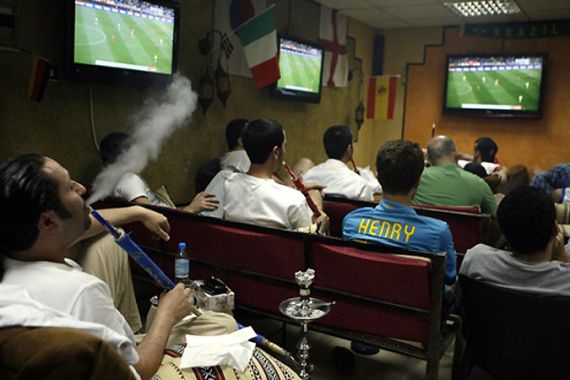US firm assists in jamming probe
Maryland company pinpoints location of interference with Al Jazeera Sports’ broadcast of the football World Cup.

An American firm has helped Al Jazeera pinpoint the location of interference that jammed the channel’s broadcasts during several games of the football World Cup earlier this year.
The signal interruptions frustrated millions of viewers across the Middle East and North Africa, who had to deal with pixellated, fuzzy images, blank screens and game commentary in wrong languages.
In a press statement on Tuesday, Integral Systems, based in Maryland, said: “Al Jazeera needed the most comprehensive satellite interference detection and geolocation system that could quickly, easily and accurately identify and locate the interference”.
The statement said that experts “quickly detected and characterised the interference, and identified the interferer’s location with an extremely high level of accuracy – within as little as 2-3 kilometres”.
Saeed Bawazir, director of technology at Al Jazeera TV, acknowledged Integral Systems’ crucial role in detecting the location of the jamming signal.
“Integral Systems’ interference, detection and geolocation capabilities and support were instrumental in identifying the satellite interference issue that impacted millions of our viewers (and) helped us locate the jammer that had severely impacted our business during the Fifa World Cup,” Bawazir said.
The US firm’s announcement came as Fifa issued a statement condemning the alleged interference in Al Jazeera Sports’ World Cup telecast.
“Fifa condemns any interference of authorised transmissions of its competitions and hopes the relevant stakeholders will solve the issue,” Fifa’s media department said in a statement on Tuesday.
“We are appalled that such interference happened during the 2010 FIFA World Cup South Africa as it denied football fans in the region the chance to follow the world game live”.
Jordanian response
While denying accusations that it jammed Al Jazeera Sports’ signal during the World Cup games, the Jordanian government has agreed to co-operate with any investigation into the claims on the condition that it is done by a team of independent experts.
This was in response to a letter sent by Al Jazeera Sports on Sunday to Ali al-Aaed, the Jordanian minister of state for media affairs and communications, calling for an official investigation into the signal jamming incidents which scrambled the network’s broadcast during the football games.
The communication from Nasser al-Kholeifi, director-general of Al Jazeera Sports, demanded that “every step be taken in order to expose the identity of the culprits responsible for the jamming”.
The letter repeated the network’s earlier statement that it had conducted a thorough analysis of the incidents using reputable international agencies to determine the location from which the disruptive signals were sent.
“The located site was defined as being in the as-Salt district inside Jordanian territories,” the letter said, adding that the tracking equipment used to track the origin of the interfering signals had a margin of error not exceeding three kilometres.
Al-Kholeifi’s letter urged the Jordanian government to inform Al Jazeera of the measures it intends to take against the culprits, adding that the network reserves its right to take legal action against those responsible for the broadcast disruptions.
The Jordanian response, issued via Petra, the state’s official news agency, called on Al Jazeera to present evidence of the allegations.
The kingdom’s co-operation offer followed a report in The Guardian alleging that “secret documents” prove that Jordan deliberately jammed Al Jazeera’s broadcast of the World Cup games.
The UK newspaper reported that the jamming was “unlikely to have been done without the knowledge of the Jordanian authorities”, and pointed to Jordanian animosity towards Al Jazeera as the reason behind the interference.
The Guardian‘s Middle East affairs editor backed the Qatar-based network’s conclusions, telling Al Jazeera on Thursday that the documents used to report his newspaper’s story were “authentic and undeniable”.